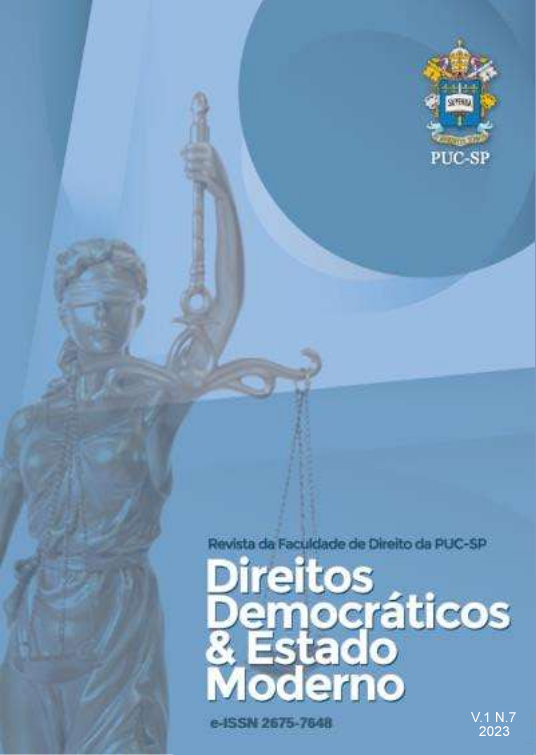Uma breve análise sobre a aplicação da justiça arbitral na seara trabalhista, com análise dos conceitos mais importantes acerca do tema
DOI:
https://doi.org/10.23925/ddem.v.1.n.7.60110Palavras-chave:
Normas, Cidadania, Acesso à justiça, Princípios, Jurisdição, Competência trabalhista, ArbitragemResumo
O presente trabalho, busca dar início ao debate acerca da aplicabilidade da justiça arbitral, na seara trabalhista, não apenas em questões que possam envolver o hipersuficiente ou questões coletivas, mas também para questões de dissídios individuais. Iremos fazer uma análise sobre as normas, cidadania, justiça, acesso à justiça, princípios, jurisdição, visão Constitucional da competência trabalhista e, evidente, a arbitragem. O trabalho utiliza o método dedutivo somado às seguintes técnicas de pesquisa: bibliográfica, documental e de levantamento de dados. Todos esses temas, seguindo a mesma linha de pensamento como a etimologia da palavra e seu conceito, as opiniões dos autores e sua provável aplicação prática.
Referências
ACQUAVIVA, Marcus Cláudio. Dicionário Acadêmico de Direito. 2. ed. São Paulo: Editora Jurídica Brasileira, 2001.
ARENDT, Hannah. As Origens do Totalitarismo. São Paulo: Companhia das Letras, 1998
BOBBIO, Norberto. Teoria Geral do Direito. 3. ed. São Paulo: Martins Fontes, 2010. p. 309.
BOBBIO, Norberto. Teoria da Norma Jurídica. 1. ed. Cidade:Edipro, 2001.
BUENO, Cássio Scarpinella. Novo Código de Processo Civil anotado. São Paulo: Saraiva, 2015.
CANOTILHO, José Joaquim Gomes. A principialização da jurisprudência através da Constituição. In: Revista de Processo, São Paulo, RT, Repro. v. 98, 2012.
CAPELLETTI, Mauro; GARTH, Bryant. Acesso à justiça. Tradução de Ellen Gracie Northfleet. Porto Alegre: Sérgio Antonio Fabris, 1988.
CARMONA, Carlos Alberto. Arbitragem e processo: um comentário à Lei n. 9.307⁄1996. 3. ed. São Paulo: Atlas, 2009
CARMONA, Carlos Alberto. Arbitragem e processo. 2. ed. São Paulo: Atlas, 2006.
CARNELUTTI, Francesco. Sistema de Direito Processual Civil. v. I. 2. ed. São Paulo: Lemos e Cruz, 2004.
CARVALHO, Ivan Lira de. A internet e o Acesso à Justiça. Disponível em: http://www.gontijo-familia.adv.br/2008/artigos_pdf/Ivan_Lira_de_Carvalho/Internet.pdf. Acesso em: 12 de jan de 2021.
CHIOVENDA, Giuseppe. Instituições de Direito Processual Civil. v. I. Campinas: Bookseller, 2000.
DALLARI, Dalmo de Abreu. Elementos de Teoria Geral do Estado. 24. ed. rev. atual. São Paulo. Saraiva, 2003.
DIDIER JÚNIOR, Fredie. Curso de Direito Processual Civil: Teoria Geral do Processo e processo de conhecimento. 7. ed. Salvador: JusPodivm, 2007.
DINAMARCO, Cândido Rangel. Fundamentos do Processo Civil Moderno. Cidade: Editora, 2001a.
DINAMARCO, Cândido Rangel. Instituições de Direito Processual Civil. v. I. São Paulo: Malheiros, 2001b.
FILHO, José Bittencourt. Acesso à justiça: por onde passa a desigualdade. In: ALMEIDA, EneáStutz e. (Org). Direitos e garantias fundamentais. Florianópolis. Fundação Boiteux, 2006.
GIL, Antonio Carlos. Como elaborar projetos de pesquisa. 5. ed. São Paulo: Atlas, 2010.
GOTTSCHALK, Egon Felix. Norma pública e privada no direito do trabalho. São Paulo: LTr, 1995.
GUERRA, Marcelo Lima. Execução indireta. São Paulo: RT, 1998.
JORGE NETO, Francisco Ferreira; CAVALCANTE, Jouberto Pessoa. Direito processual do trabalho. 7. ed. São Paulo: Atlas, 2015.
KELSEN, Hans. O Problema da Justiça. São Paulo: Martins Fontes, 1998.
LEITE, Carlos Henrique Bezerra. Curso de Direito Processual do Trabalho. 6. ed. São Paulo: LTr, 2008.
LOPES, João Batista. Curso de Direito Processual Civil. Cidade: editora, 2010.
LOPES, Maurício Antônio Ribeiro. Lei dos Juizados Especiais Cíveis e criminais: Lei nº 9.099, de 26 de setembro de 1995. Cidade: editora, ano.
MAIOR, Jorge Luiz Souto. O acesso à justiça sob a mira da reforma trabalhista — ou como garantir o acesso à justiça diante da reforma trabalhista. Disponível em: http://www.jorgesoutomaior.com/blog. Acesso em: 12 jan. de 2021
MARTINS, Sergio Pinto. Direito do trabalho. 22. ed. São Paulo: Atlas, 2006
MELLO, Celso Antônio Bandeira de. Curso de Direito Administrativo. 8. ed. São Paulo: Malheiros, 1997.
MONIZ, Fábio Frohwein de Salles. Dicionário Latim-português. 2. ed. Porto: Porto Editorial, 2001.
MOREIRA, José Carlos Barbosa. Reforma do judiciário: a emenda constitucional n° 45 e o processo. Revista Magister de Direito Civil e Processual Civil. v. 2, n. 11, p. 56- 69, mar./abr. 2006. Disponível em: http://bdjur.stj.gov.br/xmlui/bitstream/handle/2011/26309/A%20jurisdi%C3%A7%C3%A3o%20constitucional%20e%20a%20Emenda%20Constitucional%2045-0%E2%80%A6.pdf?sequence=1. Acesso em: 12 de jan. de 2021
NERY JÚNIOR, Nelson Nery. Princípios de Processo Civil na Constituição Federal. São Paulo: RT, 2000.
NERY JUNIOR, Nelson. Princípios de Processo Civil na Constituição Federal. 8. ed. São Paulo: RT, 2004.
PAMPLONA FILHO, Rodolfo. Interpretando o art. 114 da Constituição Federal de 1988. In: Revista Ciência Jurídica do Trabalho, ano I, número 04, abril/1998, Nova Alvorada Edições Ltda/Edições Ciência Jurídica, Belo Horizonte/MG, págs. 09/17. 32
REALE, Miguel. Lições Preliminares de Direito. 27. ed. São Paulo: Saraiva, 2002.
SARAIVA, Renato. Direito do Trabalho – Concursos público. São Paulo: JusPODIVM, ano.
SCAVONE JUNIOR, Luiz Antonio. Manual de arbitragem. 2. ed. São Paulo: Revista dos Tribunais, 2008.
SCHIAVI, Mauro. A Reforma Trabalhista e o Processo do Trabalho - Aspectos processuais da Lei n. 13.467/17. São Paulo: LTr, 2017
SIQUEIRA JÚNIOR, Paulo Hamilton; OLIVEIRA, Miguel Augusto Machado. Direitos Humanos e Cidadania.2 ed. rev. atual. São Paulo. Revista dos Tribunais, 2009.
SORJ, Bernardo. A Democracia inesperada: cidadania, direitos humanos e desigualdade social. Rio de Janeiro. Jorge Zahar, 2004.
STRONG, J. Léxico Hebraico; Aramaico e Grego de Strong. Sociedade Bíblica do Brasil. 2002.
TEPEDINO, Gustavo. Questões controvertidas em tema de arbitragem na experiência brasileira. In: TEPEDINO, Gustavo Temas de Direito Civil. Rio de Janeiro: Renovar, 2009.
THEODORO JÚNIOR, Humberto. Direito e Processo: Direito Processual ao Vivo. v. 5. Rio de Janeiro. Aide, 1997.
VICENTE, Joana Nunes. A invalidade parcial do contrato de trabalho. Coimbra, Gestlegal, 2017.
Downloads
Publicado
Como Citar
Edição
Seção
Licença
Copyright (c) 2023 Direitos Democráticos & Estado Moderno

Este trabalho está licenciado sob uma licença Creative Commons Attribution 4.0 International License.

Este obra está licenciada com uma Licença Creative Commons Atribuição 4.0 Internacional.
Revista DD&EM - ISSN 2675-7648
















